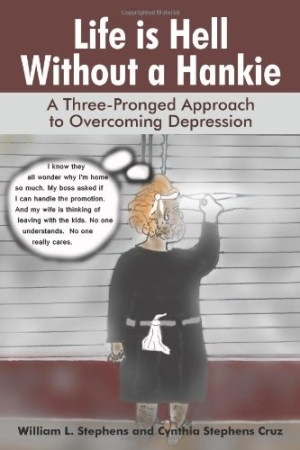
Life Is Hell Without a Hankie
“When I decided to write this book, I knew it would not be easy; I knew that I would be oppressed continually. But I made a conscious choice to face the battle that I knew would ensue.” With that mindset, William L. Stephens boldly tackles a topic that is still considered taboo by many Christians: depression. While Stephens admits that he has no medical training to qualify as an expert on the matter, his personal story of victory following an intense battle against depression and his profound insights on the subject provide the kind of hope and help (for those fighting the disease) that only a fellow sufferer can offer.
As a freshman in college, Stephens developed a chronic cold, which initiated his commitment to always carry a handkerchief, even when he did not need one. His handkerchief gave him a sense of security, and it planted the seed for the title of his book. “Not only does it describe my hellish freshman year in college, when my hankie was my constant and literal companion, it also describes my much more hellish life during depression, when my figurative and metaphorical hankie was not only my companion but also my lifeline of support.”
In Life is Hell Without a Hankie, Stephens proposes a three-pronged approach to defeating depression. He starts with the psychological and the medical aspects of depression. His explanations of symptoms, medications, and therapies have enough depth to provide a solid understanding without becoming too bogged down in medical lingo. Stephens makes his points about exercise, maintaining general health, and the importance of physical well-being as primary tool in treating depression. He writes in a tone that both encourages and challenges the reader.
Stephens dedicates the majority of his book to spiritual treatment, the third prong of his formula. He urges readers to recognize that spiritual assistance is necessary in conquering the disease, and he believes that a strong faith and relationship with God are vital to complete recovery. His chapters on these topics are powerful and convincing enough that they would also be a tremendous help to Christians dealing with any difficult issues in their lives.
It is rare that an author so transparently exposes the struggles and soul-wrenching aspects of his life without seeming to be overly dramatic or preachy. His book should be among the resources of every clergyman and Christian counselor, and depression sufferers and their families will not find a more practical, informative, and engaging book on the subject anywhere. As Stephens concludes, “I would not be where I am right now if I had given up, accepted my status quo, been afraid to fight back, or not have complete confidence in 2 Corinthians that no matter how tough things got (or ever will get), I would never be crushed, in despair, abandoned or destroyed.”
Reviewed by
Jeff Friend
Disclosure: This article is not an endorsement, but a review. The publisher of this book provided free copies of the book and paid a small fee to have their book reviewed by a professional reviewer. Foreword Reviews and Clarion Reviews make no guarantee that the publisher will receive a positive review. Foreword Magazine, Inc. is disclosing this in accordance with the Federal Trade Commission’s 16 CFR, Part 255.
